Related Research Articles

A college is an educational institution or a constituent part of one. A college may be a degree-awarding tertiary educational institution, a part of a collegiate or federal university, an institution offering vocational education, a further education institution, or a secondary school.

A liberal arts college or liberal arts institution of higher education is a college with an emphasis on undergraduate study in the liberal arts of humanities and science. Such colleges aim to impart a broad general knowledge and develop general intellectual capacities, in contrast to a professional or vocational curriculum. Students in a liberal arts college generally major in a particular discipline while receiving exposure to a wide range of academic subjects, including general sciences as well as the traditional humanities subjects taught as liberal arts. Although it draws on European antecedents, the liberal arts college is strongly associated with American higher education, and most liberal arts colleges around the world draw explicitly on the American model.

Liberal arts education is a traditional academic course in Western higher education. Liberal arts takes the term art in the sense of a learned skill rather than specifically the fine arts. Liberal arts education can refer to studies in a liberal arts degree course or to a university education more generally. Such a course of study contrasts with those that are principally vocational, professional, or technical, as well as religiously based courses.
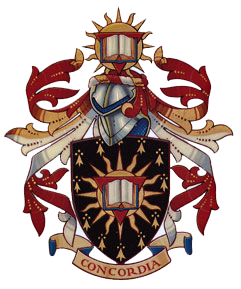
Concordia University is a public English-language research university located in Montreal, Quebec, Canada. Founded in 1974 following the merger of Loyola College and Sir George Williams University, Concordia is one of the three universities in Quebec where English is the primary language of instruction. As of the 2022–23 academic year, there were 49,898 students enrolled in credit and non-credit courses at Concordia, making the university among the largest in Canada by enrollment. The university has two campuses, set approximately seven kilometres apart: Sir George Williams Campus is the main campus, located in the Quartier Concordia neighbourhood of Downtown Montreal in the borough of Ville Marie; and Loyola Campus in the residential district of Notre-Dame-de-Grâce. With four faculties, a school of graduate studies and numerous colleges, centres and institutes, Concordia offers over 400 undergraduate and over 120 graduate programs and courses.

Macalester College is a private liberal arts college in Saint Paul, Minnesota. Founded in 1874, Macalester is exclusively an undergraduate four-year institution with an enrollment of 2,142 students in the fall of 2023. The college has Scottish roots and emphasizes internationalism and multiculturalism.

In education, a curriculum is the totality of student experiences that occur in an educational process. The term often refers specifically to a planned sequence of instruction, or to a view of the student's experiences in terms of the educator's or school's instructional goals. A curriculum may incorporate the planned interaction of pupils with instructional content, materials, resources, and processes for evaluating the attainment of educational objectives. Curricula are split into several categories: the explicit, the implicit, the excluded, and the extracurricular.
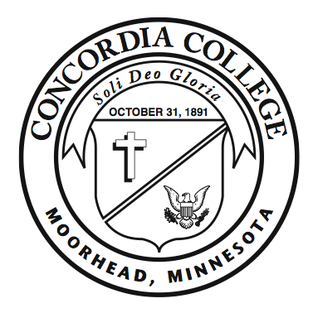
Concordia College is a private liberal arts college in Moorhead, Minnesota. Founded by Norwegian settlers in 1891, the school is associated with the Evangelical Lutheran Church in America and is unrelated to the Concordia University System operated by the Lutheran Church – Missouri Synod. Concordia is accredited by the Higher Learning Commission and has a total student enrollment of 1,800. It offers Bachelor of Arts, Bachelor of Music, Bachelor of Science in Nursing, Master of Education, and Master of Science, and Master of Music Education degrees.

Trinity Western University (TWU) is a private Christian liberal arts university with campuses in both Langley and Richmond, British Columbia. The school is a member of Universities Canada.

Saint Joseph's College is an unaccredited private Catholic college in Collegeville, Indiana, with a Rensselaer postal address. It was founded in 1889 and suspended academic operations in 2017 with approximately 1,100 students enrolled. In 2021, the college began offering some courses and certifications at the Rensselaer campus in the fields of business management, cybersecurity, and health science.

An art school is an educational institution with a primary focus on practice and related theory in the visual arts and design. This includes fine art – especially illustration, painting, contemporary art, sculpture, and graphic design. They may be independent or operate within a larger institution, such as a university. Some may be associated with an art museum.
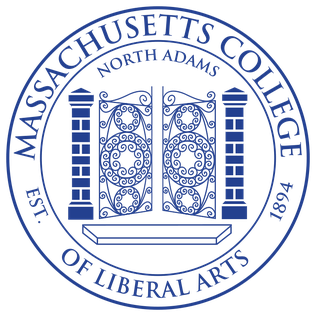
The Massachusetts College of Liberal Arts (MCLA) formerly known as North Adams State College (NASC) is a public liberal arts college in North Adams, Massachusetts. It is part of the state university system of Massachusetts. It is a member of the Council of Public Liberal Arts Colleges. Originally established as part of the state's normal school system for training teachers, it now offers programs leading to Bachelor of Science and Bachelor of Arts degrees, as well as a Master of Education track.
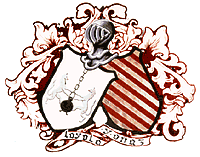
Loyola College was a Jesuit college in Montreal, Quebec, Canada. It was founded in 1896 and ceased to exist as an independent institution in 1974 when it was incorporated into Concordia University. A portion of the original college remains as a separate entity called Loyola High School.

The University of Science and Arts of Oklahoma (USAO) is a public liberal arts college in Chickasha, Oklahoma. It is the only public college in Oklahoma with a strictly liberal arts–focused curriculum and is a member of the Council of Public Liberal Arts Colleges. USAO is an undergraduate-only institution and grants bachelor's degrees in a variety of subject areas. The school was founded in 1908 as a school for women and from 1912 to 1965 was known as Oklahoma College for Women. It became coeducational in 1965 and today educates approximately 800 students. In 2001, the entire Oklahoma College for Women campus was listed as a national historic district.

Saint Anselm College is a private Benedictine liberal arts college mostly in Goffstown, New Hampshire. Founded in 1889, it is the third-oldest Catholic college in New England. Named after Saint Anselm of Canterbury, the college continues to have a fully functioning and independent Benedictine abbey attached to it, Saint Anselm Abbey. As of 2017, its enrollment was approximately 2,000.
The Associated Colleges of the Twin Cities (ACTC) is a consortium of private liberal arts colleges in the Twin Cities of Minnesota dedicated to providing cooperative programs, services, and opportunities for their respective students, faculty, staff, and administrators. The ACTC is located in Saint Paul, Minnesota. The five members of the ACTC are:
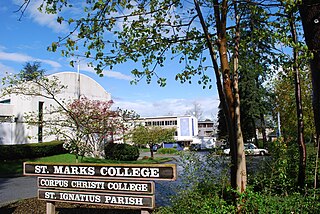
Corpus Christi College (CCC) is a Catholic post-secondary institution affiliated with the University of British Columbia (UBC), located on the UBC campus in Vancouver, British Columbia, Canada. The college provides a range of courses in arts, business, and science with an emphasis on small class sizes and close interaction between students and faculty.
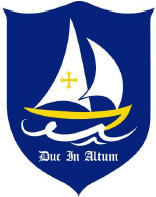
Magdalen College of the Liberal Arts was a private Catholic liberal arts college in Warner, New Hampshire. The college opened in 1973. Enrollment never exceeded 90 students and it closed in May 2024.
A college of arts and sciences or school of arts and sciences is most commonly an individual institution or a unit within a university that focuses on instruction of the liberal arts and pure sciences, although they frequently include programs and faculty in fine arts, social sciences, and other disciplines such as humanities. They are especially found in North America and the Philippines.
Great Books programs in Canada are university/college programs inspired by the Great Books movement begun in the United States in the 1920s. The aim of such programs is to return to the Western Liberal Arts tradition in education. Those who mount such programs consider them to be corrective of what they perceive to be an extreme disciplinary specialisation common within the academy.

A classic is a book accepted as being exemplary or particularly noteworthy. What makes a book "classic" is a concern that has occurred to various authors ranging from Italo Calvino to Mark Twain and the related questions of "Why Read the Classics?" and "What Is a Classic?" have been essayed by authors from different genres and eras. The ability of a classic book to be reinterpreted, to seemingly be renewed in the interests of generations of readers succeeding its creation, is a theme that is seen in the writings of literary critics including Michael Dirda, Ezra Pound, and Sainte-Beuve. These books can be published as a collection such as Great Books of the Western World, Modern Library, or Penguin Classics or presented as a list, such as Harold Bloom's list of books that constitute the Western canon. Although the term is often associated with the Western canon, it can be applied to works of literature from all traditions, such as the Chinese classics or the Indian Vedas.
References
- ↑ Rodeheffer, Jane Kelley; Sokolowski, David; Lee, J. Scott, eds. (2000). Core Texts in Conversation. p. vii. ISBN 0761816798.
- ↑ Bauerlein, Mark (2009-09-02). "The State of General Education". The Chronicle of Higher Education. Retrieved 2015-01-21.
- ↑ "Association for Core Texts and Courses & the ACTC Liberal Arts Institute » ACTC History". Archived from the original on 2015-01-13. Retrieved 2015-01-21.
- ↑ "Institutional Membership". ACTC. Archived from the original on 2015-03-27. Retrieved 2015-03-17.